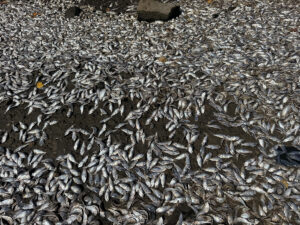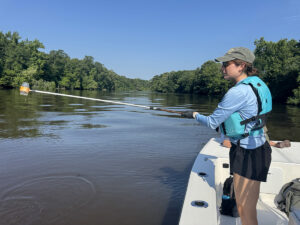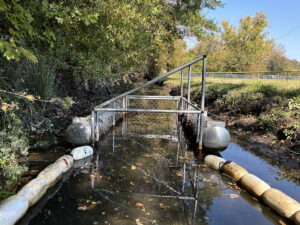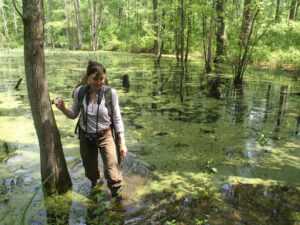News
Sound Rivers joins lawsuit over loss of clean water protections
Posted on February 18th, 2020
Conservation groups filed a formal notice of intent to sue the Trump administration today for eliminating longstanding Clean Water Act protections for the nation’s waters, including approximately half of all wetlands and potentially millions of miles of streams. The new rule allows polluters to pave over wetlands and to dump pesticides, mining waste, and other pollutants directly into these now-unprotected waterways.
“The 2020 dirty water rule recently rolled out by the Trump administration attacks long-standing protections for wetlands and small streams which will have far-reaching negative impacts on North Carolina’s environment and its residents,” said Matthew Starr, Upper Neuse Riverkeeper. “We cannot stand idly by while important clean water protections are dismantled.”
The impacts of this rollback were revealed in part by a leaked Environmental Protection Agency (EPA) analysis that indicates arid states like Arizona, New Mexico, and Nevada could lose protections for the vast majority of their waters. The loss of protections puts hundreds of endangered species at greater risk of extinction, including the Chiricahua leopard frog, Chinook salmon, and southwestern willow flycatcher.
“Trump’s despicable giveaway to polluters will wipe out countless wetlands and streams and speed the extinction of endangered wildlife across the country,” said Brett Hartl, government affairs director at the Center for Biological Diversity. “Even as we’re fighting this in court, the polluters will rush to fill in wetlands and turn our waterways into industrial toilets. So go outside, take a swim, or go fishing at your favorite spot now, because the deluge of pollution unleashed by Donald Trump will soon touch waterways from coast to coast.”
The final rule limits protections only to wetlands and streams that are “physically and meaningfully connected” to larger navigable bodies of water. The radical change repeals long-standing protections for wetlands, streams, and rivers that have been in place since the Nixon administration and that are responsible for major improvements in water quality nationwide.
President Trump’s Executive Order 13778 required EPA and the Army Corps of Engineers to review the rule defining which waters deserve Clean Water Act protections. The agencies decided to protect only those waters that have “a relatively permanent surface connection” to a territorial sea or commercially navigable body of water such as a shipping channel—a myopic legal interpretation that ignores decades of settled law and the basics of hydrology. The rule partially follows the minority legal view of the late Supreme Court Justice Antonin Scalia, which was never adopted by the Supreme Court, but goes even further to eliminate protections for many other waters across the country.
“This reverses more than 40 years of progress and settled law,” said Kelly Hunter Foster, senior attorney at Waterkeeper Alliance. “Because the rule establishes arbitrary categories of protected waters, EPA and the Army Corps do not have the data necessary to fully identify the waters that will lose protection and they haven’t even assessed the impacts of leaving these waters unprotected where adequate data is available. Their actions are not only reckless—they are illegal.”
“The culture, heritage, and biodiversity of the desert Southwest are intertwined with the health of waterways throughout the region,” said Jen Pelz, Rio Grande Waterkeeper. “The dirty water rule fundamentally undermines efforts over the past half-century to protect clean water and restore the integrity of these vital arteries of life.”
“Most of the waterways that crisscross Palm Beach County between Lake Okeechobee and the Lake Worth Lagoon will lose protection with this rule change, needlessly endangering the environment and public health, and allowing polluters to ruin the foundation of our economy,” said Reinaldo Diaz, Lake Worth Waterkeeper.
“Missouri has some of the most ecologically significant watersheds in mid-continental North America. The Meramec River basin, for example, is home to 31 species of global importance, many that are found nowhere else on Earth,” said Rachel Bartels, Missouri Confluence Waterkeeper. “As an ecologically significant wildlife area relied on by many anglers and conservationists, increased pollution and habitat degradation as a result of this rule will have devastating consequences.”
In rushing to comply with Trump’s executive order, the agencies violated both the Endangered Species Act and National Environmental Policy Act. Both laws require the federal government to “look before you leap” and ensure that the environmental consequences of a particular action will not cause unintended environmental damage.
“Clean water is the single most important resource for countless species, including humans,” says Annalisa Batanides Tuel, advocacy and policy manager at the Turtle Island Restoration Network. “Right now, we’re facing the reality of climate change and widespread habitat loss. It is critical to expand Clean Water Act protections—not shrink them—if we want to avoid mass extinction.”
Today’s notice of intent was submitted by the Center for Biological Diversity, Waterkeeper Alliance, Center for Food Safety, Turtle Island Restoration Network, Humboldt Baykeeper, Lake Worth Waterkeeper, Missouri Confluence Waterkeeper, Monterey Coastkeeper—A Program of the Otter Project, Rio Grande Waterkeeper, Sound Rivers (Upper Neuse, Lower Neuse, and Pamlico-Tar Riverkeepers), Russian Riverkeeper, Upper Missouri Waterkeeper, and Snake River Waterkeeper.
The organizations are represented by the Indian and Environmental Law Group.
Related News

Neuse fish kill expected to extend beyond holiday weekend
July 3rd 2025

Swim Guide fails prompt Maple Cypress investigation
July 3rd 2025

Riverkeeper, town partners root out source of Smithfield sediment pollution
July 3rd 2025

Trash trap No. 12 approved for Smithfield
July 3rd 2025

Sunset River Paddle fundraiser boosts Water Quality Fund
July 3rd 2025

Riverkeepers host quarterly Water Watch meeting
July 3rd 2025

Public hearing will determine the fate of many NC wetlands
June 26th 2025

Clayton gets first official trash-trap cleanout
June 25th 2025

